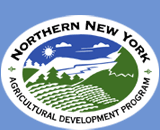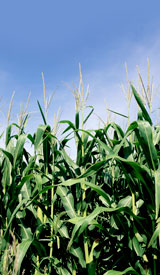 |
|
|
|
||
|
April 15, 2008 Growing raspberries and blackberries in Northern New York using high tunnels just got a lot easier. The Northern New York Agricultural Development Program just uploaded the new High Tunnel Raspberries and Blackberries guide to its website www.nnyagdev.org. Researchers at Cornell and Pennsylvania State universities have published the guide on the latest and ongoing high tunnel research in the Northeast region of the U.S. The color photo-filled High Tunnel Raspberries and Blackberries includes information on using the relatively inexpensive, usually unheated hoop structures called high tunnels for starting fruit earlier in the spring and producing berries later in the fall season. There are sections on site selection; the types of tunnels; construction; plant selection; tunnel, crop and pest management; early and late season extension techniques; and budgeting. �There is an increasing and lucrative local markets for fresh berries,� says Horticultural Educator and Cornell Cooperative Extension of Clinton County Executive Director Amy Ivy, �and berry yields from tunnel-grown crops can be two to three times greater than field-grown and are often also larger in size.� Ivy says the harvest of high tunnel berries can begin as early as May and continue into late November. High tunnel agriculture may also involve organic, low-spray or no-pesticide production practices � all of which can equate to premium profits for farmers. New York State Small Fruit Specialist Dr. Marvin Pritts says, �Raspberries are a high value crop that sell for $ 3.00 to $6.00 per1/2 pint during late fall. A tremendous opportunity exists for growers to use off-season production techniques to sell high quality raspberries to restaurants, supermarkets or directly to the consumer when there are no other local sources.� The popularity of high tunnels in the Northern New York region is expected to continue. A recent high tunnel conference organized by Cornell Cooperative Extension of Clinton County and held in Saranac Lake, NY, attracted 65 fruit, vegetable and flower growers � some already using high tunnels, others interested to learn more about the structures. Cornell Horticulture Professor H. Christian Wien says, �We expect the use of high tunnels in New York to return a gain of $500,000 per year in the farm-gate value of the state�s horticultural crops by 2010.� The USDA and New York Farm Viability Institute provided funding support to Cornell University for High Tunnel Raspberries and Blackberries by Kathy Demchak, Cathy Heidenreich, Mary Jo Kelly, and Marvin Pritts. Hard copies of the guide are available from the Cornell University Department of Horticulture in Ithaca, NY. Pritts is also the author of the recent Raspberry and Blackberry Production Guide for the Northeast, Midwest and Eastern Canada. High Tunnel Raspberries and Blackberries, the production guide and other high tunnel information links are online on the Northern New York Agricultural Development Program website at www.nnyagdev.org. The Northern New York
Agricultural Development Program is a farmer-driven research, outreach
and education program for Clinton, Essex, Franklin, Jefferson, Lewis and
St. Lawrence counties. # |
|||||
|
|
 |
|

